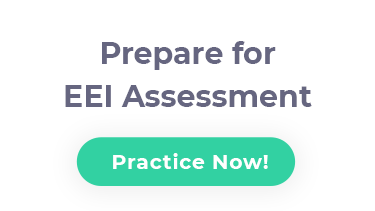Edison Electric Institute (EEI) Tests Preparation – 2025

Aptitude tests and psychometric assessments are now the order of the day for just about any job you can think of. Whether you are a recent graduate or a seasoned veteran, companies want to ensure that they are hiring a competent employee. The Edison Electric Institute or EEI have been helping investor-owned electric companies with these tests for over half a century.
What Is Edison Electric Institute?
Organized in 1933, The Edison Electric Institute (EEI) is the representational body for investor/privately owned US electric companies. EEI’s members account for over one million jobs and supplies over a third of the US population across all 50 States.
These members include and are not limited to:
In addition to their US members, EEI has a presence in over 90 countries with 65 International Members along with other Associate Members.
EEI is heavily involved in public policy, business strategy planning, as well as facilitating education and the dissemination of information through conferences and forums.
What Are the Different Edison Electric Institute Tests?
If you are a job seeker currently thinking about employment with an investor-owned electric company, there is a strong possibility that your prospective employer’s hiring process relies on EEI testing. Below is a list of the EEI exams that you might come across:
CAST
The CAST test is used in the hiring process for professions across construction and skilled trades. Prospects in the following jobs such as electrical repair, vehicle repair, and transmission & distribution are very likely to sit for this exam. The test consists of four parts; reading for comprehension, mechanical concepts, graphic arithmetic, and mathematical usage.
SOPD
The SOPD II test is used as a pre-employment assessment for candidates seeking jobs in energy control centers as a systems operator or power dispatcher. The test is comprised of four sections; mathematical usage, analytic thinking skills, reading comprehension, and multitasking simulation.
SASS
SASS, otherwise known as the Support and Systems Administrator Test is used for screening applicants for clerical and administrative support jobs.
CSR II
The Customer Service Representative Test or CSR II is a pre-employment exam used to determine prospective employees who demonstrate strong customer service skills. The test is four hours long and consists of two sections; the job skills test, and the interactive test.
POSS
The POSS exam is used to assess job seekers looking at employment as a power plant operator. The POSS test is a two-hour long exam consisting of four parts; reading comprehension, mechanical concepts, mathematical usage, and figural reasoning.
MASS
The MASS exam is an Edison Electric test similar to that of the POSS exam but is used in the screening of candidates for power plant maintenance positions. The two-hour test contains four sections; reading comprehension, mechanical concepts, assembling objects, and mathematical usage.
TECH
The Tech Test for Technician Operations is used to assess key skills expected for technician operations. Persons seeking employment as laboratory technicians, drafter or quality assurance technicians can expect to sit for this exam. This test is two-hours and is comprised of four parts; graphic problem solving, interpreting diagrams, mechanical concepts, and reasoning from rules.
MRAB
The Meter Reader Aptitude Battery or MRAB is an assessment used to evaluate candidates who will perform tasks such as meter reading and data collection. The test is less than 20 minutes long and consists of two sections; coding and using tables.
Companies That Use EEI Assessment
These are some of the many companies that use EEI tests:
How Is the EEI Test Graded?
The EEI tests are graded using a standardized system designed to evaluate various aptitudes and skills relevant to the energy industry. Each test comprises multiple sections, such as mechanical concepts, mathematical usage, reading comprehension, and graphical problem-solving, and each section is scored individually.
The scores from all sections are combined to generate an overall index score, which typically ranges from 1 to 10, with 10 being the highest possible score. This cumulative score reflects the candidate’s overall performance and aptitude. Importantly, these tests do not penalize for incorrect answers, so guessing is encouraged if the correct answer is not known. Time management is crucial, as each section has strict time limits and no calculators are allowed, requiring candidates to rely on their mental math skills and quick problem-solving abilities.
How to Pass the Edison Electric Institute Test?
The EEI series of tests are designed to assess skills in key areas such as mechanical comprehension and problem-solving. The challenge is these skills are not used on a day-to-day basis in the manner in which they are presented in the exams. Preparation is therefore key if you are going to do well at any of these tests.
You can try checking EEI’s website as your first point of reference as they have a few Edison Electric Institute practice tests, which you may attempt. The material is relatively limited and only skims the surface, but it is worth the look. There are other sources online, however, such as forums, and exam prep sites where you can find EEI practice tests, which in some cases include both questions and answers. Practice tests are best done under exam conditions, similar to what is expected at the assessment center. Coupled with that, study guides can also provide great tips and list additional resources that you may use.
Conclusion
Your EEI test prep may be the difference between spending your days sleeping on your parent’s couch or landing your dream job. Take your preparation seriously and maintain your focus, the reward will most certainly be worth it.

